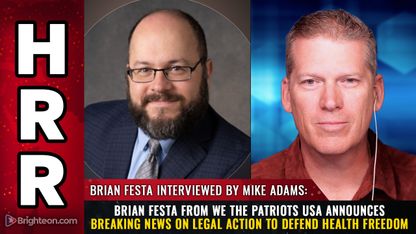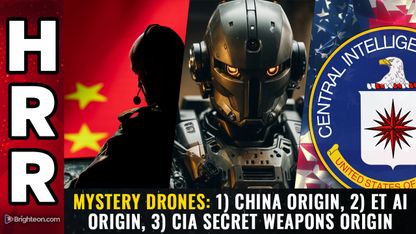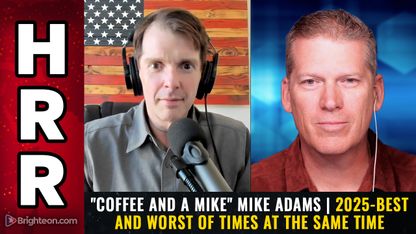
The protracted conflict between Ukraine and Russia has been going on since 2014 and centers around the regions of Crimea and the Donbas. These regions are legally a part of Ukraine, but were invaded and occupied by the Russian Army and pro-Russian separatists who wanted these areas to be part of the Russian Federation. (Related: Coronavirus, African locust plague and Iran-US conflict heralds the Second Coming of Christ, warn biblical scholars.)
The conflict in Crimea and the Donbas has never escalated into open warfare, but there are signs that Ukraine and Russia might be heading towards that. This escalation is being cited by religious scholars as the fulfillment of a prophecy made by Rabbi Elijah of Vilna, an 18th-century Polish-Lithuanian and Jewish academic.
Elijah of Vilna once reportedly handed down a prophecy to his son regarding the coming of the Jewish Messiah and the end of days. He said:
"When you hear that the Russians have captured the city of Crimea, you should know that the times of the Messiah have started, that his steps are being heard. And when you hear that the Russians have reached the city of Constantinople [Istanbul], you should put on your Shabbat clothes and don't take them off, because it means that the Messiah is about to come any minute."
While Christians believe that Jesus Christ was the prophesied Messiah, Jews believe their savior has yet to show himself.
This prophecy was revealed to the public by Elijah's great-grandson.
Rabbi Pinchas Winston, a Jewish theologian and author known for his theories regarding the end of days, said the situation between Ukraine and Russia seems to very heavily parallel the "War of Gog and Magog." Gog is a person mentioned in the Bible who rules over the land of Magog.
"It is known that Gog and Magog will come from the 'north,'" explained Winston. "The Hebrew word for 'north' also implies 'hidden.'" Before the War of Gog and Magog can erupt, Winston explained that a war between Turkey and Russia needs to erupt first.
"The two nations have faced off before," explained Winston. "Each time is like the building of a tower of explosives. It may seem like small events set off major conflicts, but in every case, the conditions were all in place, waiting for a spark to set them off."
Tensions between Ukraine and Russia only escalating further
The recent escalation of tensions between Ukraine and Russia began on March 24, when Ukrainian President Volodymyr Zelensky signed Decree No. 117/2021. This decree has been interpreted as essentially a declaration of war against Russia, since it is calling for the "de-occupation and reintegration of the temporarily occupied territory of the Autonomous Republic of Crimea and the city of Sevastopol."
Since the decree was issued, both the Russians and Ukrainians have been building up their forces near potential conflict zones in Crimea and the Donbas.
Ukrainian tanks and other military hardware have been spotted near the separatist-held Luhansk and Donetsk regions in the Donbas. The North Atlantic Treaty Organization (NATO) has reported spotting an "unusually large number" of Russian military aircraft flying over the North Sea, the Baltic Sea and, most importantly, over the Black Sea, which borders Ukraine's southern coasts.
In response, Ukraine officially opened its airspace for the use of NATO aircraft. This has led to NATO scrambling its jets multiple times to shadow the Russian military aircraft. At one point they intercepted six different groups of military aircraft flying near NATO airspace within less than six hours.
NATO has even raised its concerns regarding the buildup of Russian forces in the Donbas region. President Joe Biden had a phone conversation with Zelensky and pledged to support Ukraine against Russian aggression, while the alert status of the U.S. Eastern European Command was raised to its highest level.
Russian spokesman Dmitry Peskov responded by warning NATO against deploying ground forces in Ukraine, arguing that such a move would force Russia to respond, further escalating tensions in the region.
Zelensky has called on NATO to fast-track his country's membership into the military alliance. This is part of Ukraine's "diplomatic offensive" to shore up support from Western nations in the event that conflict breaks out between it and Russia.
"NATO is the only way to end the war in Donbas," Zelensky said during a phone call with NATO Secretary General Jens Stoltenberg. A "Membership Action Plan" to smooth out Ukraine's entry into the alliance "will be a real signal for Russia," said the president.
If Ukraine joins NATO and war between it and Russia suddenly breaks out, the U.S. could be forced to join given the country's commitment to the military alliance.
Learn more about the potential conflicts America may have to deal with in the near future by reading the latest articles at WWIII.news.
Sources include:
Please contact us for more information.























